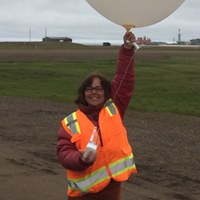Amy Solomon
(NOAA)
Evaluating and improving short-term forecasts of the Arctic ocean-sea ice-atmosphere coupled system using process relationships from the MOSAiC campaign
| What | |
|---|---|
| When |
Apr 21, 2021 03:30 PM
Apr 21, 2021 04:30 PM
Apr 21, 2021 from 03:30 pm to 04:30 pm |
| Where | To be held via Zoom, see below for links |
| Contact Name | Steven Feldstein |
| Contact email | [email protected] |
| Add event to calendar |
|

This talk is presented as a Zoom Webinar and requires a passcode. For anyone outside the department; If you would like to attend, email [email protected]
"Evaluating and improving short-term forecasts of the Arctic ocean-sea ice-atmosphere coupled system using process relationships from the MOSAiC campaign"
The primary goal of the MOSAiC (Multidisciplinary drifting Observatory for the Study of Arctic Climate) campaign was to observe the evolution of the coupled ocean-sea ice-atmosphere system over a full annual cycle in the central Arctic in order to advance the understanding of coupled processes in this sensitive, and data-poor, climate regime. This talk will present results from a model intercomparison designed to evaluate and improve the simulation of coupled processes unique to the Arctic, such as; The representation of low level (mix-phase) clouds; The representation of the stable boundary layer; Atmosphere-snow interaction; Ocean-sea ice-atmosphere coupling. Short-term forecasts are used in this project to identify potential errors in the representation of "fast" processes, such as cloud feedbacks and surface fluxes, that cause biases in climate model projections of Arctic climate change. Process diagnostics designed using observations of snow/sea-ice characteristics (from IMBs), cloud characteristics (based on radar/lidar), and surface fluxes (from 3 separate atmospheric flux stations and a 23-meter tower) are used to identify systematic biases that limit the skill of Arctic forecasts.
